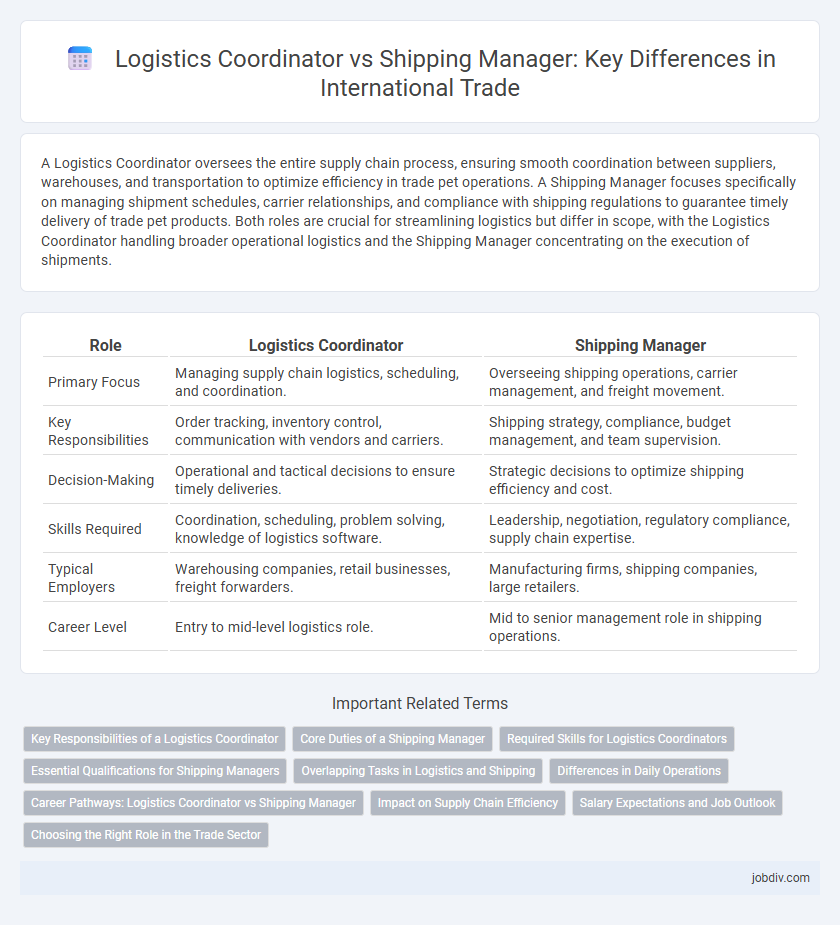A Logistics Coordinator oversees the entire supply chain process, ensuring smooth coordination between suppliers, warehouses, and transportation to optimize efficiency in trade pet operations. A Shipping Manager focuses specifically on managing shipment schedules, carrier relationships, and compliance with shipping regulations to guarantee timely delivery of trade pet products. Both roles are crucial for streamlining logistics but differ in scope, with the Logistics Coordinator handling broader operational logistics and the Shipping Manager concentrating on the execution of shipments.
Table of Comparison
| Role | Logistics Coordinator | Shipping Manager |
|---|---|---|
| Primary Focus | Managing supply chain logistics, scheduling, and coordination. | Overseeing shipping operations, carrier management, and freight movement. |
| Key Responsibilities | Order tracking, inventory control, communication with vendors and carriers. | Shipping strategy, compliance, budget management, and team supervision. |
| Decision-Making | Operational and tactical decisions to ensure timely deliveries. | Strategic decisions to optimize shipping efficiency and cost. |
| Skills Required | Coordination, scheduling, problem solving, knowledge of logistics software. | Leadership, negotiation, regulatory compliance, supply chain expertise. |
| Typical Employers | Warehousing companies, retail businesses, freight forwarders. | Manufacturing firms, shipping companies, large retailers. |
| Career Level | Entry to mid-level logistics role. | Mid to senior management role in shipping operations. |
Key Responsibilities of a Logistics Coordinator
A Logistics Coordinator oversees the entire supply chain process, ensuring timely shipment scheduling, inventory management, and coordination between suppliers and carriers to optimize delivery efficiency. They manage documentation compliance, track shipments, and resolve transportation issues to prevent delays and reduce costs. Effective communication with warehouse teams and logistics partners is crucial to maintaining smooth operations and meeting customer demands.
Core Duties of a Shipping Manager
A Shipping Manager oversees the entire shipping process, ensuring timely dispatch and accurate documentation for all outbound goods. Key responsibilities include coordinating with carriers, managing shipping schedules, and complying with international trade regulations to optimize delivery efficiency. This role demands strong leadership in supervising logistics teams and resolving shipment issues to maintain supply chain integrity.
Required Skills for Logistics Coordinators
Logistics Coordinators require strong organizational skills, proficiency in supply chain management software, and expertise in inventory control to ensure efficient goods movement. Effective communication and problem-solving abilities are essential for coordinating with suppliers, carriers, and internal teams. Knowledge of transportation regulations and route optimization further enhances their capability to manage logistics operations smoothly.
Essential Qualifications for Shipping Managers
Shipping Managers require advanced expertise in supply chain management, including proficiency in international shipping regulations, customs compliance, and freight cost optimization. Strong leadership skills and experience in coordinating cross-functional teams ensure efficient cargo handling and timely delivery. Mastery of logistics software and risk management strategies are essential to mitigate disruptions and maintain seamless shipping operations.
Overlapping Tasks in Logistics and Shipping
Logistics Coordinators and Shipping Managers both oversee the movement and delivery of goods, ensuring timely and cost-effective shipment processes. They coordinate with carriers, manage shipment schedules, track inventory levels, and handle documentation to maintain supply chain efficiency. Effective communication with suppliers and warehouse teams is critical in minimizing delays and optimizing logistics operations.
Differences in Daily Operations
Logistics Coordinators typically manage daily shipment schedules, track inventory levels, and coordinate communication between suppliers and carriers to ensure timely delivery. Shipping Managers oversee broader operational activities, including warehouse management, compliance with shipping regulations, and strategic planning to optimize supply chain efficiency. While Logistics Coordinators focus on real-time shipment execution, Shipping Managers handle overall process improvement and resource allocation within logistics departments.
Career Pathways: Logistics Coordinator vs Shipping Manager
Career pathways for Logistics Coordinators typically begin with entry-level positions in supply chain operations, advancing through roles such as inventory analyst or transportation planner before progressing to managerial positions. Shipping Managers often start with hands-on shipping or receiving roles, moving up to supervise warehouse teams, and eventually managing entire shipping departments with responsibilities including freight negotiation and compliance oversight. Both careers benefit from certifications like Certified Logistics Associate (CLA) or Certified Shipping Manager (CSM), which enhance promotion prospects and salary potential within the trade and logistics sector.
Impact on Supply Chain Efficiency
A Logistics Coordinator optimizes daily operations by managing shipment schedules, tracking inventory, and coordinating with carriers to reduce delays and costs, directly enhancing supply chain responsiveness. A Shipping Manager oversees the strategic planning and execution of shipping processes, ensuring compliance, managing budgets, and improving freight efficiency, which strengthens overall supply chain reliability. Both roles are crucial for minimizing disruptions and maximizing the efficiency of goods movement within the supply chain.
Salary Expectations and Job Outlook
Logistics Coordinators typically earn an average salary ranging from $45,000 to $60,000 annually, while Shipping Managers command higher compensation, often between $60,000 and $85,000 due to greater responsibilities. The job outlook for Logistics Coordinators is projected to grow by 5% over the next decade, reflecting steady demand in supply chain operations. Shipping Managers face a slightly faster growth rate near 7%, driven by the increasing complexity of global trade and the need for efficient shipping management.
Choosing the Right Role in the Trade Sector
Selecting the right role in the trade sector depends on specific logistics and shipment needs, where a Logistics Coordinator focuses on managing supply chain activities and optimizing transportation schedules, while a Shipping Manager oversees shipping operations, compliance, and team management. A Logistics Coordinator is ideal for handling day-to-day coordination, inventory control, and vendor communication, whereas a Shipping Manager emphasizes strategic shipping processes and regulatory adherence. Understanding company priorities and operational scope helps trade businesses determine whether tactical coordination or strategic shipping leadership aligns better with their goals.
Logistics Coordinator vs Shipping Manager Infographic

 jobdiv.com
jobdiv.com